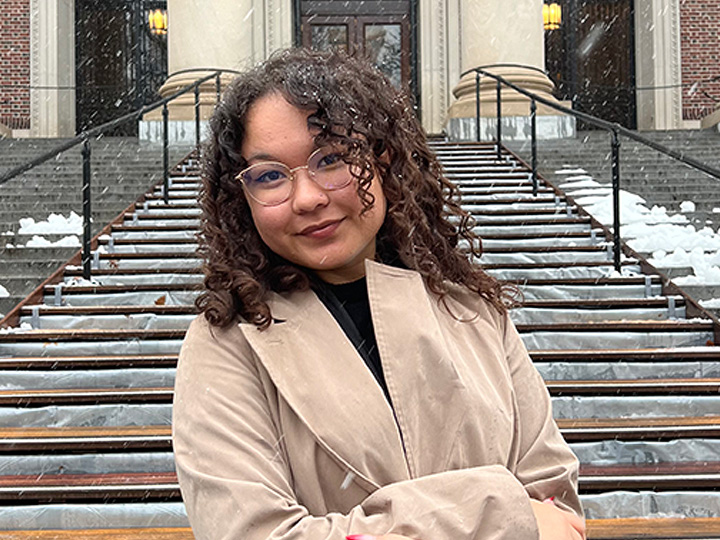
It’s the rare undergraduate who has already experienced presenting their original research at an academic conference. Now imagine you’re a sophomore bringing a new, Black Studies-meets-Deep Time lens to literary studies and Harvard University comes knocking. Even amid the immense field of talent in Roy Cullen, only one undergraduate currently fits this bill: Kalena Holeman.
Aided by a Research Travel Fellowship from the Office of Undergraduate Research and Major Awards as well as direct funding from the English Department, Ms. Holeman traveled to Harvard in January to present at Harvard’s 2023 National Collegiate Research Conference (NCRC), the nation’s largest student-run research conference.
FORWARD spoke with Ms. Holeman to discuss what it was like to present her project, “Reimagining the Dantean Katabasis: Literary Inheritance in Ralph Ellison’s Invisible Man and Derek Walcott’s Omeros,” at Harvard University.
FORWARD: We’re fascinated by the complex intertextuality of your project. Can you tell us more about your methodology?
Holeman: My project examines the influence of Dante’s Divine Comedy on Ralph Ellison’s Invisible Man and Derek Walcott’s Omeros. I argue Walcott and Ellison use Dante as inspiration, a waypoint, from which to express their views on Black experiences and reconstruct the canon in a distinct literary style. At the same time, I’m also illuminating a less-studied relationship between Ellison and Walcott. Too often scholars have overlooked the relationships between Black diasporic writers themselves alongside the ways in which their texts engage with the deep past.
FORWARD: Can you say more about these blind spots?
Holeman: The influence of antiquity on modern Black writers has historically been overlooked—not to mention the connections between Black writers from different geographic regions like Ellison and Walcott. I’m particularly intrigued by the tapestry of intellectual relationships between Black American and Black Caribbean writers, with their shared history of loss, of the Middle Passage and slavery. Scholars such as Emily Greenwood and Matthew X. Vernon have pioneered the critical concepts of Black Classicism and Black Medievalism. My project builds on their scholarship.
FORWARD: Why did Ellison and Walcott turn to Dante?
Holeman: Ellison crafted his magnum opus in the wake of the Harlem revolts of 1935 and 1943. Published in 1952, the novel follows a nameless Black man as he migrates from the Jim Crow American South to the supposedly liberating North. Ellison turned to various intertexts to contextualize his narrator’s journey and Dante was particularly pivotal as an intermediary of the classical tradition as well as a proponent of vernacular language. For example, Dante wrote Inferno after his exile from Florence. I think a common sense of loss and alienation from one’s homeland inspired both Ellison and Walcott. Ellison lived the tumult of the American civil rights movement, while Walcott experienced a similar turmoil facing postcolonial St. Lucia, which was grappling with what it means to be “postcolonial” and its relationships with neocolonialism. Both texts are also similar in that their narrators’ descents take the form of a search for artistic direction.
FORWARD: What was it like presenting your project at Harvard?
Holeman: The opportunity was a lower stakes foray into the world of academic conferences, which is incredibly helpful to someone like me who is planning on going to graduate school and pursuing a career in academia. Not only was I able to see the campus of one of my top options for grad school, but I had the chance to discuss my research with distinguished faculty like Dr. Greenwood. My experience at Harvard also inspired me to apply to and present at other conferences, including Johns Hopkins’s Richard Macksey Humanities Symposium. In preparing for this opportunity, I received great guidance from professors Dr. Daniel Davies in the English Department and Dr. Max Rayneard who leads the Frameworks Program in Honors, which has given me the wonderful opportunity to research a project I’ve truly come to love.